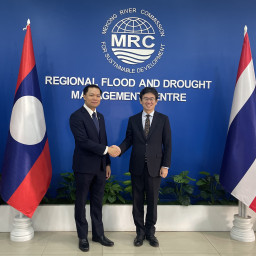Water quality monitoring vital to development in the Mekong Basin
Water quality monitoring vital to development in the Mekong Basin
Environmental monitoring was a crucial element of responsible and sustainable development within the Mekong River basin, Mekong River Commission Environment Programme Director Dr Wijarn Simachaya told participants at the Environment Annual Technical Meeting, being held in Siem Riep, Cambodia today.
Dr Wijarn said the water quality of the Mekong River was an issue of concern to all countries who share the Mekong River’s water and it was heartening to see that the MRC’s member countries were committed to promoting balanced sustainable development to provide benefits for the current generations whilst preserving the resources and development options for future generations. The work of the MRC Environment Programme was directly contributing to the achievement of this common goal.
He explained that the Water Quality Monitoring Network in the Lower Mekong Basin had operated since 1985 with a total of almost 100 stations taking monthly samples of the river’s water. “The network has now been revised to ensure that it covers the important transboundary and basinwide aspects of water quality,” Dr Wijarn said. “This monitoring is crucial to ensuring the development activities in the basin do not result in unacceptable deterioration of the river’s water quality, jeopardising other uses of the water.”
The meeting heard reports on the results of analysis of the regular monitoring data from the MRC’s four member countries of Cambodia, Lao PDR, Thailand and Viet Nam.
Water quality assessment is one of the major environmental monitoring activities in which the MRC is engaged and which form its overall goal of maintaining the health of the river. The meeting also heard the results of basin-wide bio-assessment techniques which, combined with the water quality data, have provided an overview of the basin’s ecological health, which was presented in the form of a MRC Basin Report Card.
The Environment Programme is also involved in environmental risk assessment, which determines if adverse ecological effects occur or are occurring as a result of human activities. Data, information, assumptions and uncertainties are evaluated and used to help understand and guide environmental management. A social impact monitoring system is also being developed to complement the chemical and ecological monitoring of the Mekong River’s waters.
Finally the meeting heard how environmental flow assessment can demonstrate the link between the people and the river and also ensure the prediction on how the river could change with flow changes and how those changes impact people and their livelihood.
-ends-
For More Information
Ms Tiffany Hacker, Interim Communication AdvisorTel: +856 56120695 or +856 21 263 263 Ext. 4703
Email: damian@mrcmekong.org
Mr Khy Lim, Communication Officer
Tel: +856 20 5622 8131
Email: khy@mrcmekong.org




